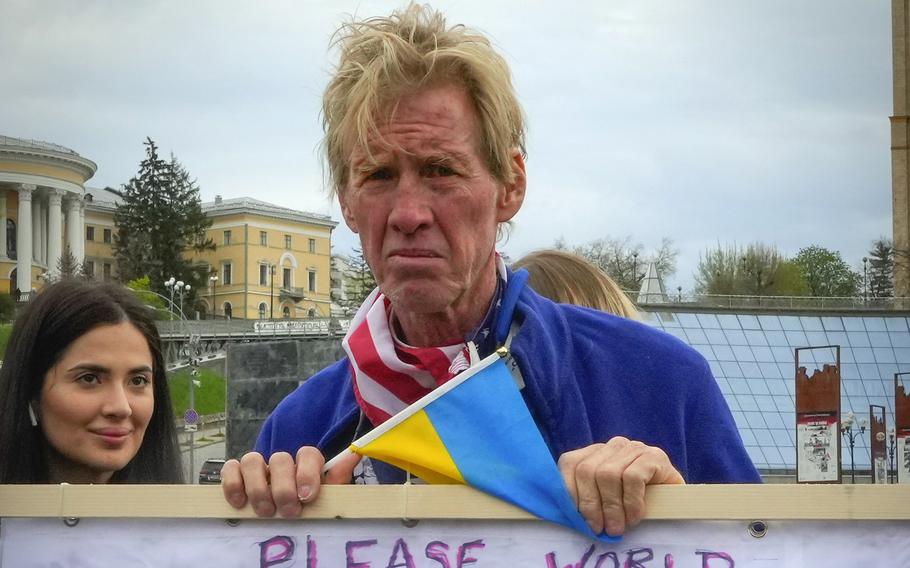
Ryan Routh takes part in a rally in Kyiv, Ukraine, in April 2022. (Efrem Lukatsky/AP)
Ryan Routh, the accused would-be assassin of Donald Trump, had no business being in Ukraine following Russia’s 2022 invasion. Then again, a bizarre aspect of the war has been the inordinate number of tourists, profiteers and self-appointed saviors attracted to the conflict.
Having served in the U.S. military for 20 years, I know every war has its hangers-on and wannabes. But what I saw in Ukraine while fighting to defend that country in its International Legion of foreign volunteers was on another level. After Russia’s 2022 invasion, the Ukrainian government was scrambling, making up its self-defense on the fly, and that provided plenty of openings for unstable characters like Routh to try to get involved, reinvent themselves or just make some money.
By the end of 2022, dozens of new nongovernmental organizations had set up shop in apartments all around Kyiv. You’d see the NGO folks in new pickup trucks and ambulances most likely purchased with donations drummed up online.
Some made worthwhile contributions to Ukraine’s self-defense, but it was clear to me that many of these people should never have been let into the country. They were a new breed of wartime volunteers, living a pretty good life off PayPal or Venmo donations made by well-meaning people far from the conflict. Even if these volunteers had few, if any, qualifications, they’d turn up as rear-area medical rescue operators, military trainers, freelance war correspondents or, as with Routh, supposed recruiters of foreign fighters.
Routh, with no military experience, had attempted to join the International Legion but was turned down. That’s when he pivoted to calling himself a military recruiter. Not for us — as he would have known from his own experience, the legion has strict enrollment guidelines to insulate the unit from infiltration by Russian assets. Yet Routh was well known in Kyiv for approaching any foreigner he encountered and offering placement in a Ukrainian combat unit. I never encountered him directly but was aware of his presence.
Like Routh, many others came to Kyiv claiming influence and insider access. I’m thinking of a guy who claimed to be a CIA officer, recounting his “rescue” and “spy” missions, but whose main occupation was couch-surfing in the living rooms of good-hearted people from Kharkiv to Kyiv. Then there was the Canadian who turned up in Ukraine claiming to be a combat trauma trainer but turned out to be a heavy prescription drug user and was kicked out of the country.
Again, many foreign NGOs in Ukraine do good and necessary work, helping hospitals, providing ambulances, supporting drone purchases. But plenty of others simply don’t have a role to play and either cannot or will not return home. Unlike the rough conditions of the wars in Iraq and Afghanistan, Ukraine — even now — is a functioning Western society, with inexpensive restaurants and comfortable cafes where volunteers can sit in comfort and pretend they’re part of the fight to defend democracy and repel a vicious invader.
The members of the International Legion swore an oath to the Ukrainian government, passed the vetting and deployed to combat zones. We drew the same salary as the lowest Ukrainian soldier, and for the first six months of the war, that meant zero pay. (The legion has more than 1,000 fighters, in four battalions. I returned to the United States at the end of 2022 and head a foundation to support its work.)
Yes, we’ve had our share of people who tricked the vetting teams and were admitted. The legion has had to eject some bad apples, including an American wanted for a double homicide in Florida and an Australian financial fraudster. One young former U.S. Army soldier turned out to be mentally unstable and wasn’t allowed near a weapon.
In each instance, the person was found out and removed quickly from service. What happened when they left? The accused murderer was extradited to the United States. Some went back home. Others remained in Ukraine, living the wartime expat life.
Despite his pose, Routh had no power to get volunteers into the Ukrainian army. But he clearly wanted to feel as if he were participating in the war in some way. And so he hung out near Kyiv tourist attractions, hawking his supposed access and contacts to young men who didn’t know any better. He failed at that mission.
Routh eventually left Ukraine, but with his erratic dreams of glory apparently intact. His latest attempt at reinvention seems to have been as a presidential assassin. As the Secret Service announced, he failed at that, too.
Malcolm Nance, an author whose books include “The Plot to Destroy Democracy,” is president of the Foundation for the International Legion.